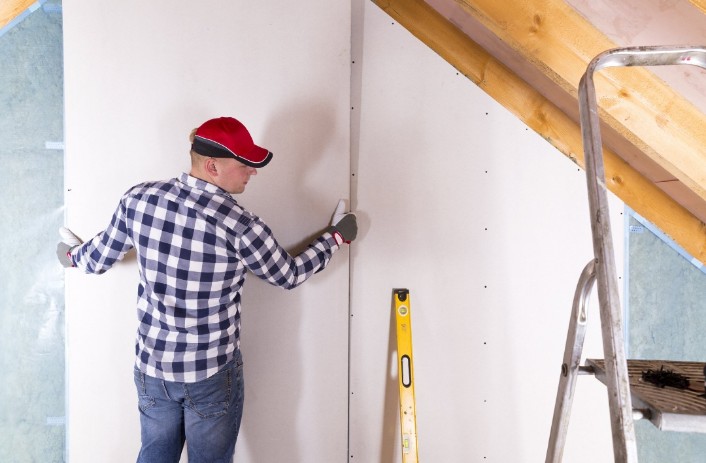What if you could make your home significantly more energy-efficient while saving money on heating and cooling? Well, that can happen if you choose the right type of drywall for your home’s interior.
If you’re considering insulated drywall, you’re on the right track. Below, we will share some of the many benefits of this drywall type. That way, you can decide whether or not it’s the right choice for your next home project.
Ready to learn more? Then, it’s time to dive in and explore the world of insulated drywall!
Contents
1. Enhanced Soundproofing
Insulated drywall is a specialized building material engineered to minimize sound transmission between different spaces. It achieves this through a combination of materials designed to effectively absorb and dampen sound waves. This makes it an excellent choice for spaces where noise control is critical.
For example, residential applications can create a quieter and more peaceful environment in bedrooms, home theatres, or home offices. It can help maintain privacy in offices, conference rooms, and recording studios in commercial settings.
Additionally, an insulating existing wall can be a convenient retrofit solution to improve soundproofing without the need for extensive renovations, making it an ideal choice for remodeling projects seeking acoustic enhancements.
2. Improved Thermal Insulation
Insulated drywall excels in soundproofing and offers notable thermal insulation properties. Many types of insulated drywall feature integrated insulating materials, such as foam layers or other high-performance materials. This added insulation helps regulate indoor temperatures, reducing the need for excessive heating or cooling.
Consequently, it can contribute to lower energy bills and a more comfortable living or working environment. It’s particularly advantageous in homes seeking to enhance energy efficiency and reduce carbon footprint.
3. Space Efficiency
One of the best things about insulated drywall is that it saves room. Insulated drywall differs from traditional drywall, which needs to be paired with separate drywall insulation.
Instead, it blends both functions into a single panel. This means that you can use smaller wall structures and keep out noise and heat. This can be especially helpful in areas with thin walls because it lets you make the most of the floor space.
4. Moisture Resistance
Insulated drywall that can handle wetness is a good choice for bathrooms, kitchens, and basements. This drywall is made to keep water out, so it won’t get damaged by water or let mold or mildew grow.
Because it doesn’t absorb water, your walls will last longer and stay strong. This makes it a good choice for places where humidity levels can be high.
5. Easy Installation
Even though it has advanced features, insulated drywall is pretty easy to put up. It requires no tools or methods not usually used when putting up drywall. This makes it easy to install for both do-it-yourselfers and professional contractors, which could save time and money during building or remodeling jobs.
Whether building a new room or remodeling an old one, installing insulated drywall is a simple process that can speed up your job.
Elevate Your Space with Insulated Drywall
Overall, it is clear that insulated drywall offers a range of significant benefits, from energy efficiency and cost savings to improved indoor air quality and soundproofing. Its ease of installation and versatility make it a smart choice for any home or building project.
Don’t miss out on these big benefits – consider upgrading to insulated drywall today!
Did you find the information in this article helpful? If so, be sure to check out our blog for more valuable resources.

